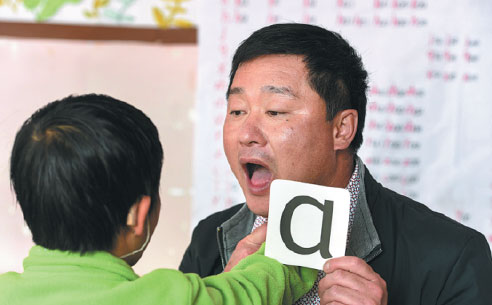Persistence gives disabled a voice

Xu Zhihong (left) and Zhou Xihua, both special education teachers, take students to experience nature on a mountain in Huocheng county, the Xinjiang Uygur autonomous region.Hu Huhu / Xinhua
Special school founded by the parents of hearing-impaired twins is helping other families. Thanks to their parents' persistence, twin brothers Xu Jian and Xu Kang are embarking on careers as special education teachers after graduating from college.
Xu Zhihong and Zhou Xihua were ecstatic when they welcomed the twins into the world in the Xinjiang Uygur autonomous region on Sept 7, 1994, naming them Jian and Kang, the Chinese characters for healthiness.
But life did not turn out as they hoped.
When they heard Jian say his first word - 10 months later than what they were told was "ordinary" - they wept because they had been waiting so long to hear him speak.
"At first, we noticed that Xu Jian never reacted to the sound of bike bells," Xu Zhihong said.
When they took him to see the doctor, the diagnosis was what they had feared. "Our boy can't hear a thing. He can only feel vibrations," Xu Zhihong said.
They took Jian to the best hospitals in Beijing and Shanghai, and even tried alternative therapies. But the answer was always the same - there was no cure, and the only way for Jian to learn to communicate was through sign language.
But his vocal system was intact, and his parents couldn't comprehend why he couldn't be taught to talk, just like everyone else. In their search, they turned to Helen Keller's autobiography, The Story of My Life.
Copying Keller's teacher Anne Sullivan, they wrote the Chinese characters for words on Jian's hands and on their arms.
When they saw a tree, they wrote the character shu and shouted the word repeatedly.
To show Jian how his vocal cords and tongue worked, they put his hands on their throats and tongues so he could feel every syllable.
To teach Jian the word for "cattle", his first word, they took him to see a herd each day and told him, "Niu!"
Xu Zhihong said one occasion is burned into his memory. As the family sat on a slope, waiting for the herd to show up, a heavy sadness washed across him. He could hear the babbling of a brook down the hill, birds chirping in the trees, leaves rustling in the evening breeze. But in his 19-month-old son's world there was just silence.
Jian's breakthrough came three months later, on July 15, 1996, when he uttered the word niu. His parents were thrilled, knowing that the notes and labels they had pinned and stuck everywhere at home were working.
Within a year, Jian had a vocabulary of 300 words and was able to hold simple conversations.
Just as the family was celebrating its success, a cruel twist of fate came again. In the summer of 1997, Kang caught a cold and was left deaf by an adverse reaction to medicine. He had learned to talk by then, but his vocabulary was limited. Pulling themselves together, the couple began to teach Kang in the same way as Jian, with the same dedication.
The parents, both primary school teachers, struggled to make ends meet. They sold almost everything they owned and moved a dozen times for cheaper rents.
They channeled all their focus on teaching their sons, using methods they created themselves. They managed to scrimp and save to pay for a cochlear implant for Jian in 2006 and later a hearing aid for Kang, whose hearing loss, while severe, was not as profound as Jian's, and the two boys went on to attend mainstream schools.
Helping others
Soon after the parents helped their sons talk, others began knocking on the door of their Huocheng county home, asking for help. The couple did not turn anyone away, and became well-known among parents of children with hearing defects.
Over the past two decades, they have helped and inspired more than 200 children, who still affectionately call them Papa Xu and Mama Zhou.
Xinjiang, home to 47 ethnic groups, has more support for disabled children nowadays, but special education schools still lack enough teachers who can speak both Mandarin and at least one local ethnic minority language.
In 2000, four-year-old Lu Yanzi was brought to the couple for help. Xu Zhihong agreed without hesitation. "I wanted to help the family, just as many people had helped me," he said. "Looking at the yearning in their eyes, how could I refuse them?"
Lu, born without hearing, was the couple's first special education student. Her parents said she hardly ever smiled and had behavioral difficulties. The first thing they needed to do was to rebuild her confidence. "We must be the cheering team. We must keep encouraging the kids," Xu Zhihong said.
They would reassure each child that they were not much different from others. "If you are nearsighted, you can wear glasses. If you can't hear, you can wear a hearing aid. You are just the same as everyone else," Xu Zhihong said.

Xu Zhihong instructs a hearing-impaired child to practice pronunciation at the special school in Huocheng.Photos By Hu Huhu / Xinhua
Within six-months, Lu had made her first sound.
"Life is better than a textbook," Xu Zhihong said. They took the children to parks and fields and let them see, touch and smell everything.
Lu's success was their best advertisement. For a while their home was so crowded with children that they had to rent another house. Every day they got up at 7 am to go to work and wouldn't get to sleep until 2 am the next day.
After Xu Zhihong and Zhou established their center for the hearing impaired in 2007, the miracles kept happening.
Three-year-old Gulifila learned to sing 40 songs within three months. Six-year-old Ulan made his father cry when he learned to say "dad" in a month. Dandan, 16, managed to find a job after six months' training.
The local government granted the center special education school status in 2011. Today Xu, Zhou and 16 teachers, including Xu Jian and Kang, offer free education to 73 students.
Kang said: "Now my biggest wish is to do a good job. I want to learn more professional skills and, by combining them with my parents', to help more students learn to talk."
But Xu Jian said that one day he wants "a different job, a career of my own".
"I do love my students, but I want to try something different," he said. "But right now teaching at the special school is what I'm better at."
Xu Zhihong said: "Jian used to talk a lot about his life and his dream with me. But he doesn't talk about them so much today. I know what he really wants, and I feel sad about that. But today I can't help him with that any more."

Zhou Xihua displays the cards they made to teach children how to speak.Photos By Hu Huhu / Xinhua
Two of the children at the school, Nazray Tulusbek, 8, and her brother Alapar Tulusbek, 10, have been studying there for four years. Their father, Tulusbek Hamit, a herder, still remembers how difficult it was balancing the nomadic lifestyle with the needs of his children.
"I would have given anything to help them talk, even sell my flock," he said. He was advised to send the children to Xu Zhihong and Zhou's school.
One day, he arrived at the school to pick them up for the weekend.
"As I walked in, I heard Alapar call me 'dad'. It was just three weeks!" he said, adding that he asked his son to keep saying "dad" all the way back home.
In 2016, the brother and sister received government grants for cochlear implants that cost at least 140,000 yuan ($20,175) - a huge sum to a poor family.
Xu Zhihong and Zhou remain committed to helping children make the most of their lives.
"We must teach them to become real people," he said. "They must be taught that they are not a burden, and that they can be independent and kind, and live like everyone else."





















